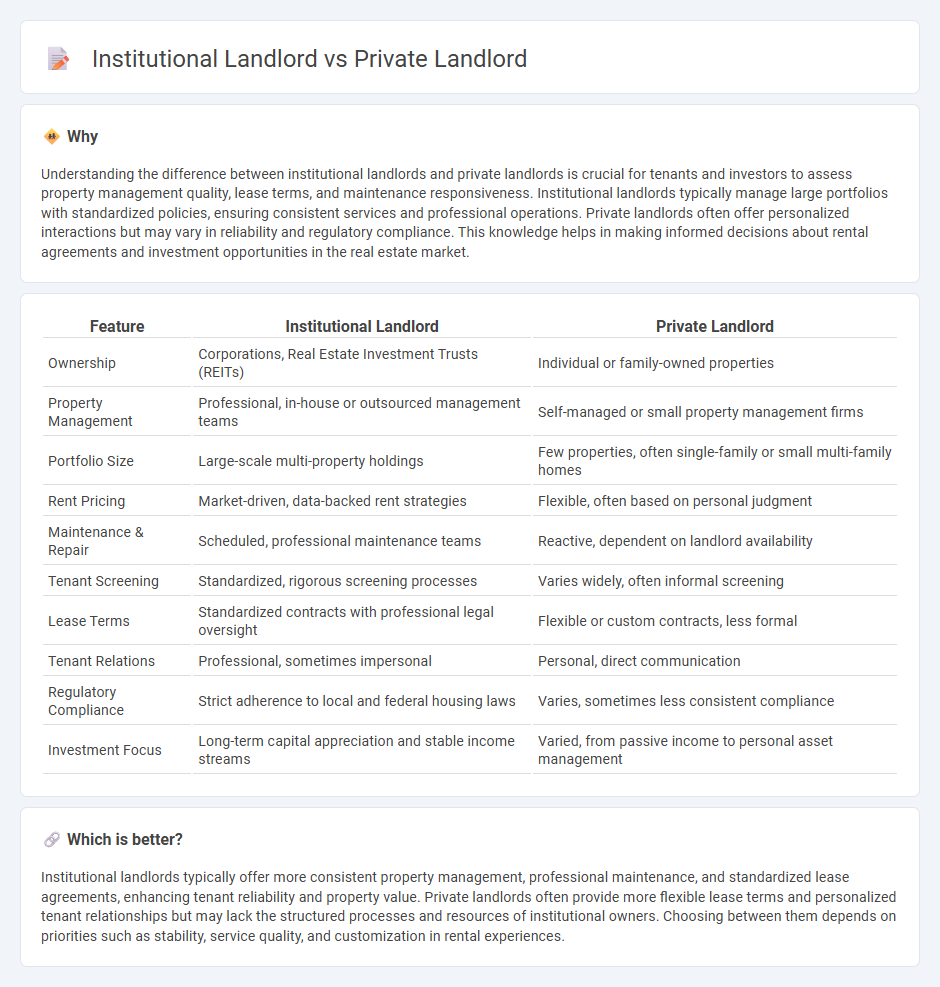
Institutional landlords typically manage large portfolios of commercial or residential properties, leveraging advanced property management systems and professional teams to optimize returns and maintain asset value. Private landlords often own fewer properties, focusing on personal investment goals and hands-on management, which can result in more flexible tenant relationships but less scalability. Explore the key differences between institutional and private landlords to determine which aligns best with your real estate investment strategy.
Why it is important
Understanding the difference between institutional landlords and private landlords is crucial for tenants and investors to assess property management quality, lease terms, and maintenance responsiveness. Institutional landlords typically manage large portfolios with standardized policies, ensuring consistent services and professional operations. Private landlords often offer personalized interactions but may vary in reliability and regulatory compliance. This knowledge helps in making informed decisions about rental agreements and investment opportunities in the real estate market.
Comparison Table
| Feature | Institutional Landlord | Private Landlord |
|---|---|---|
| Ownership | Corporations, Real Estate Investment Trusts (REITs) | Individual or family-owned properties |
| Property Management | Professional, in-house or outsourced management teams | Self-managed or small property management firms |
| Portfolio Size | Large-scale multi-property holdings | Few properties, often single-family or small multi-family homes |
| Rent Pricing | Market-driven, data-backed rent strategies | Flexible, often based on personal judgment |
| Maintenance & Repair | Scheduled, professional maintenance teams | Reactive, dependent on landlord availability |
| Tenant Screening | Standardized, rigorous screening processes | Varies widely, often informal screening |
| Lease Terms | Standardized contracts with professional legal oversight | Flexible or custom contracts, less formal |
| Tenant Relations | Professional, sometimes impersonal | Personal, direct communication |
| Regulatory Compliance | Strict adherence to local and federal housing laws | Varies, sometimes less consistent compliance |
| Investment Focus | Long-term capital appreciation and stable income streams | Varied, from passive income to personal asset management |
Which is better?
Institutional landlords typically offer more consistent property management, professional maintenance, and standardized lease agreements, enhancing tenant reliability and property value. Private landlords often provide more flexible lease terms and personalized tenant relationships but may lack the structured processes and resources of institutional owners. Choosing between them depends on priorities such as stability, service quality, and customization in rental experiences.
Connection
Institutional landlords, such as real estate investment trusts (REITs) and private equity firms, often acquire large portfolios of rental properties that were initially owned by private landlords. This connection is facilitated through market transactions where private landlords sell properties to institutional landlords seeking economies of scale and professional management. Both entities contribute to the rental housing supply, influencing market dynamics, rental prices, and tenant demographics.
Key Terms
Ownership Structure
Private landlords typically own a limited number of properties, often managing them individually or with small teams, leading to personalized tenant relationships and quicker decision-making processes. Institutional landlords, such as real estate investment trusts (REITs) or large property management firms, hold extensive portfolios with structured corporate governance and standardized operational procedures aimed at maximizing asset value and returns. Explore detailed comparisons of ownership models and their impact on rental markets to better understand your landlord options.
Property Management
Private landlords typically manage fewer properties, allowing for personalized tenant relationships and hands-on property maintenance. Institutional landlords operate large-scale portfolios, utilizing advanced property management systems and professional teams to optimize efficiency and compliance with regulations. Explore more to understand how each approach impacts tenant experience and property value.
Regulation Compliance
Private landlords often face less stringent regulation compliance compared to institutional landlords, who must adhere to comprehensive legal frameworks and reporting standards. Institutional landlords are subject to rigorous inspections, tenant rights enforcement, and mandatory safety protocols that ensure higher accountability and transparency. Explore how these regulatory differences impact tenant experiences and property management effectiveness.
Source and External Links
How to Find Private Landlords | Zillow - This guide provides tips on finding and working with private landlords, highlighting benefits like personal communication and potential flexibility in lease terms.
What is a private landlord? - Steadily - It explains the role of a private landlord, including advantages such as lower rents and direct communication with tenants, but also highlights challenges like maintenance responsibilities.
For Rent by Private Owner - HotPads - The site offers a platform to browse 'For Rent by Owner' properties in California, allowing renters to work directly with private landlords for various types of rentals.
 dowidth.com
dowidth.com